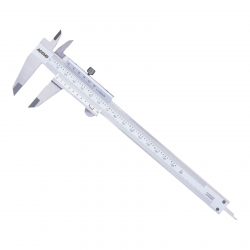



| Quantity | Unit Price | You Save |
|---|---|---|
| 5 or more | R 374.60 | 3.70 % |
| 10 or more | R 360.73 | 7.27 % |
| 20 or more | R 346.85 | 10.83 % |
- Stock: 369
- Model: ME11150
- Weight: 0.21kg
- Dimensions: 265.00mm x 85.00mm x 25.00mm
- SKU: ME11150
- UPC: 6009515819002
- MPN: 1
Resolution: 0.02mm
Accuracy: ±0.02mm
Measuring range: 0 - 150mm
An analog vernier caliper is a precision measuring tool used to accurately measure external, internal, and depth dimensions of objects. Unlike its digital counterpart, it relies on a manual reading of two scales to determine measurements.
The primary scale provides the base measurement, while the vernier scale provides the precise fraction of that measurement. The alignment of the lines on the main and vernier scales determines the final reading.
Analogue vernier calipers are widely used in mechanical engineering, machining, and various scientific fields for their precision and reliability. They do not require batteries and are generally less susceptible to damage from moisture or magnetic fields compared to digital versions.
Application:
- Depth/height measurements
- External jaws for external measurements
- Internal jaws for internal measurements
- Depth blade for depth measurements
- Machine setup
- Manufacturing
- Construction
- Woodworking
- DIY
How to use and read an analog vernier caliper:
- Undo the locking screw and open the jaws of the caliper and position both jaws firmly to the ends of the piece being measured.
- Tighten the locking screw so that the jaws don't move.
- The vernier is divided into two different measurement scales. The main scale and the vernier scale (fixed onto the bottom jaw).
- On the vernier scale is a small number 0. Look at how many markings the 0 has passed on the main scale. This represents the amount of millimetres measured.
- The decimal is determined by the alignment of the markings on the vernier scale to the main scale. The first alignment from left to right will be the decimal reading accurate to 0.02mm.
- On the diagram below is an example of a piece measured at Ø17.28mm.
- This method can be used to measure:
- Depth by using the stem.
- Inner dimensions by using the inner jaws.
- Outer dimensions by using the outer jaws.

Handling and care of vernier calipers:
- The inside faces of the jaws and the outside tips must be treated with great care. The tool will no longer give accurate readings if the jaws are bent or worn.
- Wipe the faces of the vernier caliper clean from dust or dirt.
- The accuracy should be periodically checked by measuring a known dimension.
- Analog vernier calipers should be lightly oiled to prevent rust.
- A vernier caliper is a measuring instrument and should be safely stowed away to prevent any damage that might occur.
Features:
- Thumb grip
- Jaw lock screw
- Metric scale
| Description | Specification |
| Packaging Type | Plastic case |
| Tool Dimensions | 265(L) x 85(W) x 25(H)mm |
| Tool Weight | 210g |
| Material | Stainless Steel |
| Resolution | 0.02mm |
| Accuracy | ±0.02mm |
| Measuring range | 0 - 150mm |






































































